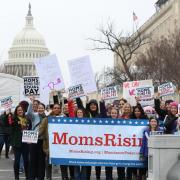MomsRising.org Celebrates LGBT Pride Month, Recognizes Work Left to Be Done to Attain Equality
The month of June marks LGBT Pride month and there's much to celebrate. This week, in a move that helps many same-sex couples, the Supreme Court of the United States struck down part of the Defense of Marriage Act, also known as DOMA, which barred married same-sex couples from receiving hundreds of rights available to married heterosexual couples under federal law.
While the U.S. Supreme Court decision doesn’t grant same-sex couples the right to marry across the nation, it does mean that those who are legally married in states that do grant that right can now receive critical federal protections like Social Security, veterans’ benefits, health insurance, retirement savings, and sponsor their partners for immigration, which is a major victory.
Same-sex mom couples experience a double whammy of both sexuality-based and gender-based wage discrimination. You can see the impact of this discrimination in a study reported by the New York Times that found that families with two moms were the least likely to have a stay-at-home parent, heterosexual couples were the middle most likely to have a stay-at-home parent, and families with two dads were the most like to have a stay-at-home parent. Since motherhood is now a greater predictor of wage discrimination than gender, same-sex mom couples often experience the biggest economic hits, making it highly important to address the intersectional impacts of this type of discrimination.

The views and opinions expressed in this post are those of the author(s) and do not necessarily reflect those of MomsRising.org.
MomsRising.org strongly encourages our readers to post comments in response to blog posts. We value diversity of opinions and perspectives. Our goals for this space are to be educational, thought-provoking, and respectful. So we actively moderate comments and we reserve the right to edit or remove comments that undermine these goals. Thanks!